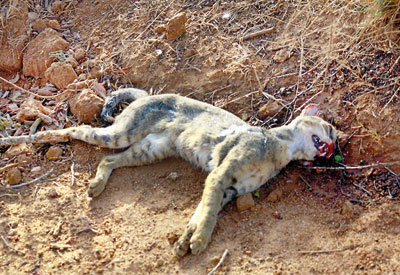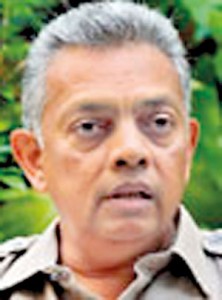News
Don’t leave conservation solely to Wildlife Dept: Former DG Pilapitiya

Jungle cat killed in a collission with a vehicle in Yala-2012 . (pic courtesy Hansa Premakumara)
“Sri Lanka has the potential of being the best wildlife tourism destination outside Africa, but only if done the right way,” Department of Wildlife Conservation’s (DWC) former Director General Dr. Sumith Pilapitiya said at a public lecture on Thursday.
Delivering the Wildlife and Nature Protection Society’s (WNPS) monthly lecture on the topic, ‘‘Civil Society’s Role in Conservation” Dr. Pilapitiya, who resigned from the post in June this year after serving for a few of months, called on civil society to stand together and play a role in conserving wildlife as the DWC cannot do it alone, especially when it comes under political pressure.
“While revenue generation from wildlife tourism is important, it should not be done at the expense of conservation because if there is no wildlife, there is no chance for generating revenue from wildlife tourism. Therefore, DWC should give priority to conserving and protecting the country’s wildlife resources,” he stressed.
A survey carried out in 2010 by a university on visitor experience in wildlife parks revealed that a majority of foreign visitors who repeatedly holidayed in Sri Lanka visited a national park only during their first visit.“The “quality” of the visitor’s experience is much more important from the point of view of both wildlife conservation and revenue generation than the “quantity” or number of tourists visiting our national parks, Dr. Pilapitiya said.
Expanding on the aspect of quality, the former Director General said DWC guides have to be better trained in nature interpretation to provide visitors with a memorable experience. In addition, safari jeep operators should also be trained in driving etiquette and nature interpretation since many jeep drivers are not accompanied by DWC guides due to lack of staff. Discipline of safari jeeps and other vehicles entering the national parks was key to a better visitor experience, the former DG stressed.
He said currently about 650 safari jeeps are registered in Yala Block-I while ideally the number of vehicles should be in the range of 150 a day to prevent overcrowding of the park. However drastic measures to limit the number of vehicles should not be taken overnight as there could be possible repercussions. “If we immediately restrict the number of vehicles many could lose their jobs. Economic opportunities in areas surrounding Yala are limited and these jeep drivers won’t have a source of livelihood. Don’t forget they know every bush in this wilderness and there is a lucrative market for bush meat. So what is the guarantee that such an act would not push them to be poachers which is far worse,” Dr. Pilapitiya pointed out, adding that the solution should be gradual and well thought out.

Dr. Sumith Pilapitiya
Over-visitation was a serious problem mainly in three parks–Yala Block-I, Minneriya and Horton Plains. He warned that there were signs of it becoming a problem in parks such as Wilpattu, Udawalawa and Kawdulla. “Let’s prevent over-visitation by imposing regulations now itself, Dr.Pilapitiya said.
The former DG also questioned the prudence of national planning that doesn’t envisage the bigger picture. He cited the plan to keep the Minneriya tank at spill level throughout the year for irrigation endangering the annual elephant gathering. Hundreds of elephants gather during the dry season around the Minneriya tank bed to feed on fresh shoot of grasses. If Minneriya tank is at spill level year round, a large area of the grassland that emerge during the dry season would be submerged depriving the elephants of food. This would escalate human-elephant conflict in surrounding areas in the short term time with elephants looking for fodder compelled to raid crops. In the long term the future conservation of the 300-400 elephants of the area would be in jeopardy.
The gathering has been recognised as one of the 10 wildlife spectacles of the world. The overall revenue gained from wildlife tourism around the gathering is estimated to be $1.25 million, but this would be lost if Minneriya tank was at spill level year round. Besides, no agricultural revenue generated from this irrigation project would add $1.25 million to the national economy, Dr. Pilapitiya pointed out.
The Government recently signed an agreement for a $45 million loan from the World Bank to carry out a project on Ecosystem Conservation and Management Project (ESCAMP) which has provision to fund activities to improve Wildlife Tourism. Dr.Pilapitiya stressed the importance of using these resources to make a significant improvement in the quality of wildlife tourism here.
| Stand up for Conservation: Pilapitiya tells civil societyWhile the Department of Wildlife Conservation (DWC) should be the driving force of the “Conservation Agenda” of the country, the systematic politicisation of the public service since the 1970s does not allow the department to do its job. While political authorities should provide policy direction and allow the agencies to implement the policies, now politicians not only provide policy direction but they get involved in implementation as well. Unfortunately, a politician’s long term planning horizon is usually six years which is the election cycle, but for good conservation initiatives, planning must be on a much longer time horizon, Dr. Pilapitiya said.“While we should stand up against such interference, it is unreasonable to expect a person whose survival depends on the job to stand up to political pressure. There are many instances in this country where public servants who stand up to political pressure have been victimised. “Here Civil Society can play a bigger role. They do not face the pressure that DWC officers face, so if they can collectively have a voice, it can help mitigate some of the detrimental decisions that would hurt conservation goals,” Dr.Pilapitiya stressed adding that private enterprises should utilise their CSR money for more wildlife research as data was required to make sound decisions. He said Government funds allocated to departments hardly support research and information gathering. |

